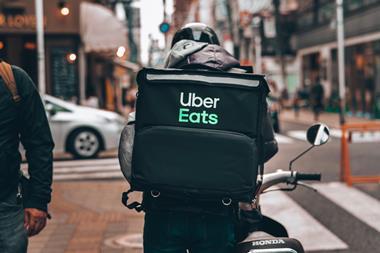Last month, the NHS wrote to around 1.5 million people in England warning they were at “very high risk of severe illness from coronavirus”.
Recipients have been told to stay at home “at all times” and avoid any face-to-face contact for a period of at least 12 weeks. That includes “going out for food”.
To get supplies, those deemed “extremely vulnerable” are advised to “ask a friend, neighbour or family member” for help. The letter implies that it’s also risky for someone else in the household to do the shopping, even though those on the so-called ‘shield list’ are advised to minimise contact with them, too.
As a result, many of those shielding are turning to online grocery as their last hope in staying fed. They are not alone. Supermarket delivery services have been swamped by demand in recent weeks as Brits look to avoid going to the shops.
So what should those who have received a letter do to secure a slot?
If you have received a letter and want to get a priority supermarket delivery slot, you must visit the website on the letter and fill out the online form
The government is sharing a database of people on the shield list with supermarkets to help them assign priority slots.
However, the government is not sharing the entire shield list. To get on the database shared with supermarkets, letter recipients must register here.
Although the website wording can seem like you are registering to get on the shield list, you are registering to “get support” as a shielding person, which includes priority deliveries.
The online form will ask for your name and details, and your NHS number. This number is on the letter, but you can also proceed if you don’t have it to hand.
The form asks: “Do you have a way of getting essential supplies delivered at the moment? For example, friends or family who can make sure you have enough food.”
To get on the list shared with supermarkets, you must answer ‘No’.
Next, the form asks if you have any dietary requirements and tells you that “deliveries will be left on the doorstep”.
This is because everyone on the shield list also qualifies for a free food package from the government.
Even if you don’t need a free food package from government, you must answer these questions and submit the online form in order to get on the database shared with supermarkets.
Defra advises those shielding who only need access to online delivery slots to turn away the free food box at the doorstep when it arrives if they don’t want it, and it will be given to someone else. Once a delivery slot has been secured with a supermarket, you can go back and edit your needs.
It is understood supermarkets are receiving updates to the database on a weekly basis.
You have completed the additional support form AND are an existing online customer of a supermarket. Now what?
In most cases the supermarket will be proactively trying to contact you. In other cases, next time you log in there will be slots available to you.
Waitrose: “We’ll be in touch with our customers on the list – they will see priority access to delivery slots when they log in (on an ongoing basis). Please be reassured that we’re doing all we can as quickly as possible. To allow us to cope with demand, we are kindly asking customers to wait for communication from us rather than trying to get in touch at this time.”
Ocado: “We have already identified our customers on this list and reached out to offer them delivery slots with Ocado.com. We will continue to play our part as the government updates its shield list of people in need of support. In order for us to identify you on the government’s list, you must declare that you are in need of getting essential supplies delivered to you.”
Asda: “We’ve contacted everyone who is on the list the government gave us and offered them free, recurring delivery slots.”
Tesco: Existing customers should call 0800 917 7359.
Sainsbury’s: “We continue to receive more data and have been able to match nearly 250,000 additional customers against our database so far, and are contacting them to arrange priority home delivery.”
Morrisons: Has not revealed any use of the government database to give priority to those in it.
Iceland: “We are regularly emailing customers that we have matched and are providing exclusive times for them to book a slot before other customers. The details on how to do this are contained within the email they receive, including a special link to use.”
You have completed the additional support form BUT are NOT an existing online customer of a supermarket. Now what?
“We are looking at how we can assist those who are clinically vulnerable, but who are not on any supermarkets’ existing online customer list, to gain access to an online delivery slot,” Defra says.
In the meantime, if you are on the database shared with supermarkets but are not on the retailer’s own customer database, you will need to register as a new customer with one.
Most supermarkets are still accepting new online customer registrations.
Tesco: “New customers who have a letter from the NHS can either create an account online or call us on 0800 917 7359. We will then be able to verify whether they are on the government’s list.”
Iceland: “We’re receiving regularly updated data from the government, so for new customers to be matched to this, they just need to create an Iceland account. Customers should make sure that the data they register with matches that which they have provided to the government to ensure we can match it.”
Sainsbury’s: “We are working with government to understand how we can support customers who are not already signed up to a home delivery service.”
Asda, Waitrose and Morrisons are also accepting new online customer registrations. Ocado is not.
If you live in Scotland, Wales or Northern Ireland the whole process is similar. But supermarkets can’t help yet
In Scotland 136,000 people are in the shielded group and have been asked by text if they want their details forwarded to supermarkets for priority service. In Wales 88,000 are on the shield list, which has been passed to supermarkets.
Housing minister Julie James last week acknowledged it was “very unlikely” all would get a priority slot and urged family and friends to help. In Northern Ireland there are 10,400 homes where someone is shielding.
NI minister for communities Deirdre Hargey has said informing retailers is more complicated than in England because patient information is held on disparate databases.
The supermarkets have stated they are ready to assist those on shield lists in each country but are waiting to receive government databases.
“I’ve wasted hours, getting up in the middle of the night to try and find slots”
Hazel Dakers received a text from the NHS on March 31, informing her that she had been identified as extremely vulnerable. A four-page letter followed days later, spelling out that coronavirus put her at “very high risk of severe illness”.
Warned to stay at home “at all times” and avoid any face-to-face contact for a period of at least 12 weeks, Dakers went online in the hope she could get groceries delivered rather than put herself at risk by visiting a store in person.
Like so many others who have received the NHS letter, securing a delivery slot has been close to impossible.
“I have been battling to obtain a supermarket slot on a regular – even if not frequent – basis. I have been banging my head against a brick wall,” said the 70-year-old, who suffers from asthma and other chronic conditions. “I feel very distressed.”
”I have been banging my head against a brick wall”
Dakers, who lives in Brentford in west London, had already bought an Ocado Smart Pass on the advice of her son in March, booked one delivery and received it. But she hasn’t been able to secure a slot since, because three deliveries with the pass are required before Ocado considers someone a priority customer. She has a Waitrose card and had set up an order three weeks in advance. As she was editing her order to include items for neighbours, the slot vanished.
“I was dismayed, and angry,” Dakers said. “It’s not what I find entertaining.”
Dakers called the Sainsbury’s customer careline and left her details. Weeks later came an automated call back: “The wording and tone came across as though they didn’t believe me.” The advice given if she thought they had made a mistake was to call another number, but she would need a Nectar card first, which she doesn’t have.
By “sheer chance” – tipped off by her daughter, who had heard on a community website that Tesco were releasing new slots one evening – Dakers managed to secure a one-time slot with the supermarket.
“I’ve wasted hours, getting up in the middle of the night to try and find slots. Many times at midnight trying to find one. And many hours trying to source things elsewhere from independent shops,” Dakers says. “I’m extremely vulnerable, and they can’t be bothered.”




















No comments yet